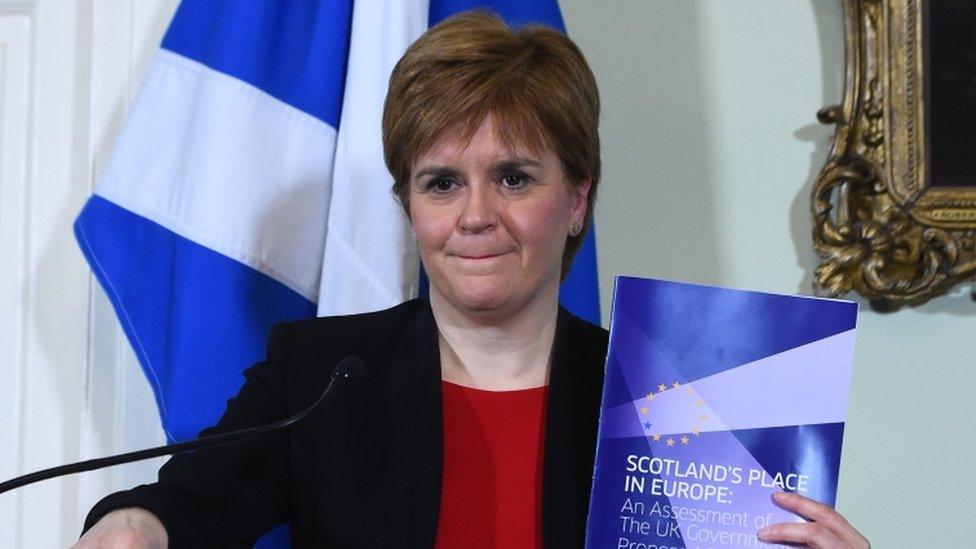Brexit: Theresa May insists deal with EU is 'good for Scotland'
- Published
Theresa May insisted her deal would protect jobs and provide new opportunities for exporters
The prime minister has insisted her Brexit agreement is a "good deal for Scotland" that will protect jobs and provide new opportunities for business.
Theresa May was speaking as she met factory workers in Renfrewshire as she seeks to build support for the plan.
Her proposals have faced strong criticism from opposition parties - as well as from many of her own MPs.
But she says the country is facing a straight choice between her deal, or leaving the EU without any deal.
Ahead of Mrs May's visit to Scotland, the UK government published analysis which suggested the country's economy could be up to 3.9% smaller after 15 years under her Brexit plan, compared with staying in the EU - but that a no-deal Brexit could deliver a 9.3% hit.
The Bank of England subsequently warned that a no-deal Brexit would send the pound plunging and trigger a worse recession than the financial crisis.
Mrs May's proposals are opposed by Labour, the SNP, Liberal Democrats, the Democratic Unionists and many Conservative MPs on both sides of the Brexit debate - meaning she currently looks unlikely to get parliamentary approval for her deal.
On Tuesday, First Minister Nicola Sturgeon unveiled a Scottish government analysis paper which claimed the Brexit deal could cost Scotland £9bn a year by 2030, compared to if it had remained in the EU.
Ms Sturgeon, who wants the UK to remain permanently in the single market and customs union and has backed calls for another referendum on the Brexit terms, has said the SNP's 35 MPs at Westminster will vote against the deal on 11 December.

Nicola Sturgeon unveiled Scottish government analysis of the deal at her Bute House residence on Tuesday
But the prime minister said the deal she had negotiated for the UK would be a "good deal for Scotland" as it would provide a "free trade area with no tariffs, no fees".
She added: "That will mean a opportunity to carry on their trade. but also gives us the opportunity to negotiate trade deals around the world that will be good for great Scottish exports like Scotch Whisky, Scottish salmon and smoked salmon.
"So this is a deal that is right for Scotland and right for Scottish fishermen, because we'll take back control of our waters and ensure they have a bright future for Scottish fishing."
Labour's shadow chancellor, John McDonnell, has suggested it is "inevitable" another EU referendum will be called if Labour are not able to force a general election.
But Mrs May said his comments were proof that Labour "want to go against and overturn the vote of the British people".

The UK government has highlighted the support the deal has received in recent days from Diageo, National Farming Union Scotland, the Scotch Whisky Association and BAE Systems, who have also warned about the consequences of "no deal" for Scotland.
Jim Ratcliffe - the owner of chemicals giant Ineos, which operates the Grangemouth facility - has also said Mrs May's deal had his "full support", describing it as a "pragmatic and sensible arrangement".
The company said its analysis showed a no-deal Brexit would carry "significant risk" for its business, and urged MPs to "put the good of the country ahead of political considerations and ensure a safe passage for the deal through Parliament."
SNP MP Douglas Chapman asks Mrs May about lessons from the Brexit negotiations that will help Scotland dissolve the Act of Union
The trip to Scotland was the latest stop in a two-week tour by Mrs May as she tries to promote and sell her deal to the public and business.
On Tuesday, the prime minister made similar visits to Wales and Northern Ireland - where she faced criticism from Democratic Unionist leader Arlene Foster, whose party has a parliamentary pact to support the Conservative government in key votes.
And speaking as she unveiled the Scottish government's latest Brexit analysis paper, Ms Sturgeon said the deal was "unacceptable to the Scottish government and damaging to the people of Scotland".
The document included analysis - first published in January - claiming that a new free trade agreement could leave Scots £1,600 worse off per year by 2030, compared to a scenario where the UK remains in the EU.
It also warned the "backstop" being put in place to prevent the return to a hard border in Ireland could leave Scotland at a "serious competitive disadvantage" to Northern Ireland.
Ms Sturgeon said: "It will not end uncertainty. It will extend it. We are being asked to accept a blindfold Brexit with all the difficult decisions kicked down the road."